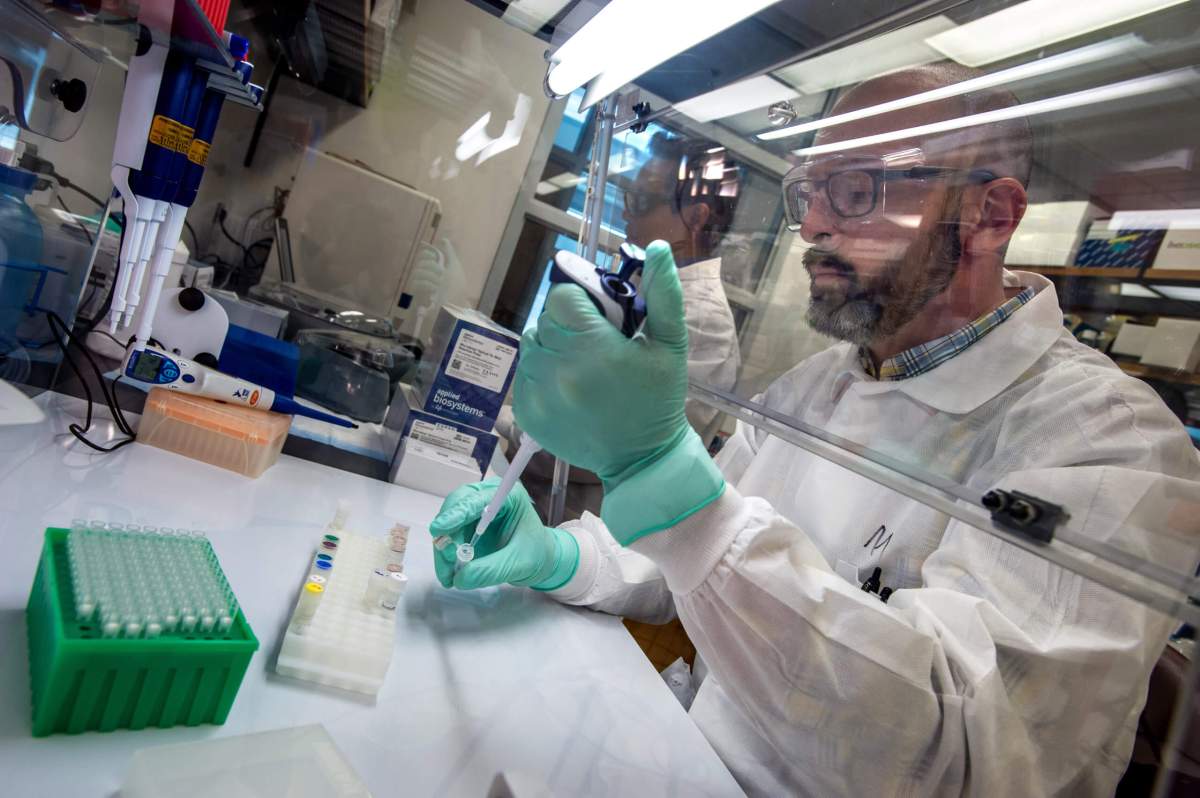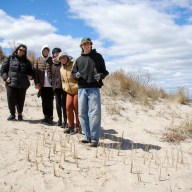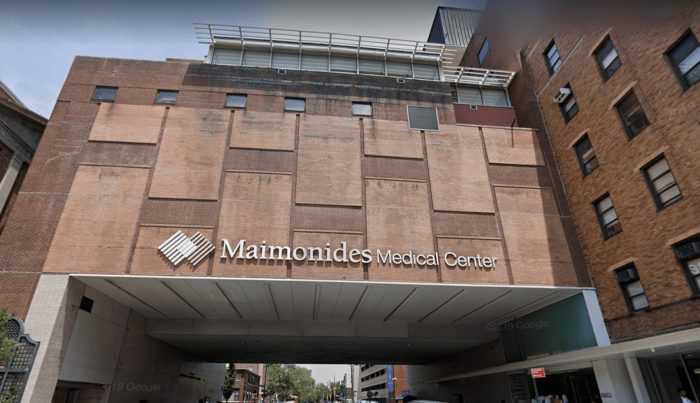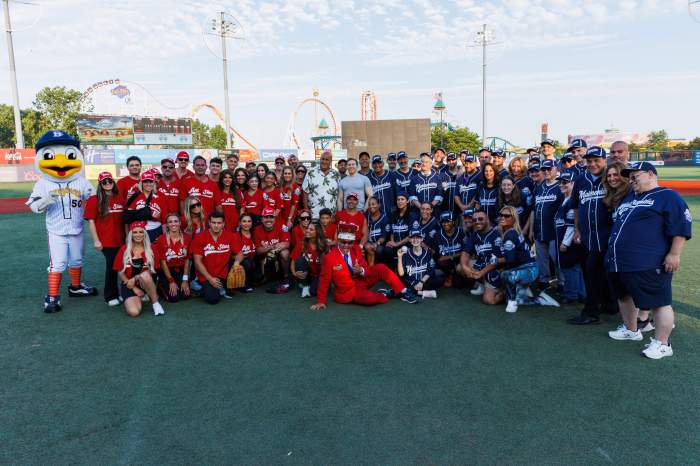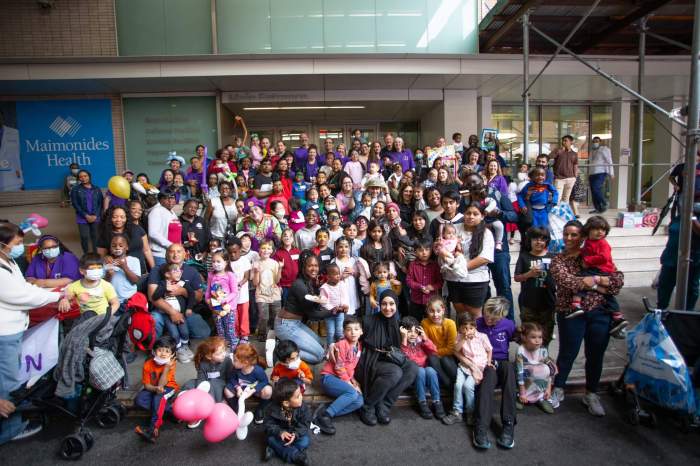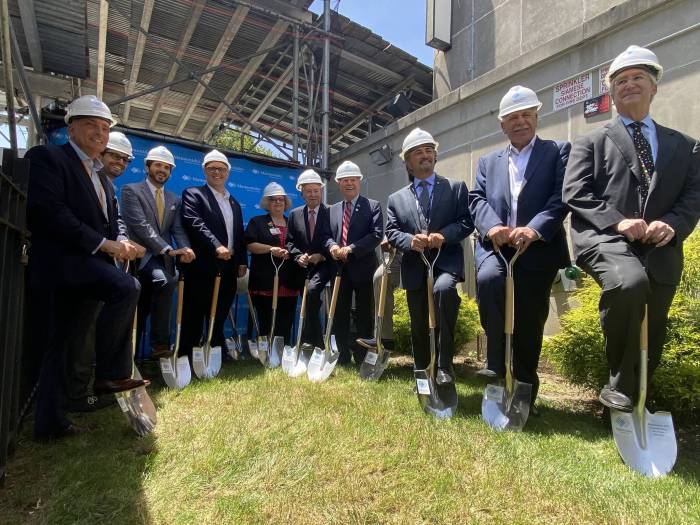Last month, after news broke that the once-eradicated polio virus had been found in New York City wastewater samples, at least one city resident realized she had never been vaccinated for the disease as a child.
The self-described “pandemic nerd” of her friend group, Miranda, a 30-year-old who moved from Brooklyn to Queens last year, reassured her social circle that they weren’t at immediate risk — only one case of paralytic polio had been confirmed in an unvaccinated man in Rockland County, and most of her buddies had been vaccinated against the disease as children.
But Miranda, who asked to be identified by first name only, knew she probably hadn’t been. She has spent a “large part” of her adult life getting caught up on the childhood vaccines she missed, she said, but no doctor’s office had mentioned the polio jab.
When she saw the news, her reaction was “Oh my god, I forgot about polio,” she said.
A resurgence of polio in New York City
The highly-contagious disease has been considered eradicated from the U.S. since the late 1970s, after two effective vaccines — the famous active oral polio vaccine, which was distributed on sugar cubes, and the inactive intramuscular vaccine, which has been used exclusively in the U.S. since 2000 — were developed and distributed widely.
While no cases have been confirmed in New York City, six “samples of concern,” have been identified in the city’s wastewater — four in July and one in June, according to an Aug. 26 update from the state’s Department of Health. Statewide, 43 samples have been identified — which means the first case was probably a result of community spread, according to the department.
“The polio in New York today is an imminent threat to all adults and children who are unvaccinated or not up to date with their polio immunizations,” said state health commissioner Dr. Mary T. Bassett. “Every New Yorker, parent, guardian, and pediatrician must do everything possible to ensure they, their children, and their patients are protected against this dangerous, debilitating disease through safe and effective vaccination.”
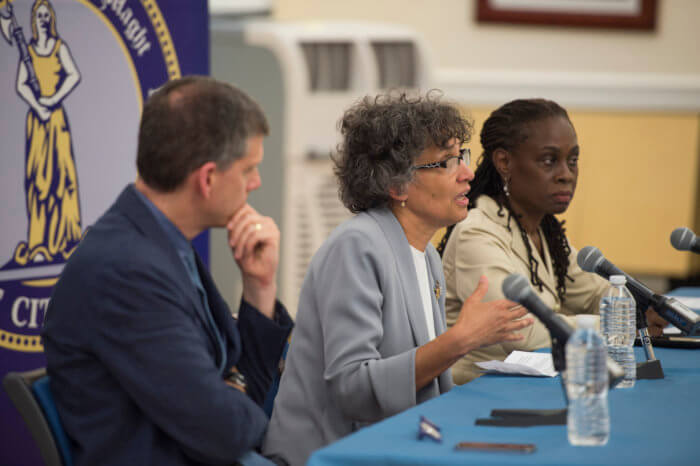
Vaccination is the best way to prevent polio infection and the spread of disease in young children, among whom the virus is most prevalent. Children usually receive a three-shot series of vaccines for polio at two months, four months, and six months of age, but the first and last vaccines can be given at as young as six weeks or as old as 18 months, said said Dr. Tsoline Kojaoghlanian, a pediatric infectious disease specialist at Maimonides Children’s Hospital. A fourth vaccine is often given when a child enters public school at around age 4.
But only 86.2% of children from six months to five years old have received three doses of the vaccine, according to the city’s Department of Health. In Brooklyn, only 81.2% of children have received all three shots — the lowest rate in the five boroughs — and four of the five city ZIP codes with the lowest vaccination rates are in Brooklyn.
Brooklyn also lagged in COVID vaccination rates last year.
In ZIP code 11206 in Williamsburg, only 56.3% of children have been fully vaccinated against polio, according to the city. In 11233, which includes parts of Bedford-Stuyvesant, Ocean Hill, and Brownsville, that number is 58.4%. That number is slightly higher in 11211, which contains East Williamsburg and Williamsburg.
Vaccination rates, risk, and preventing infection
“Obviously, the lower the vaccination rate in the community, then the higher your risk of contracting polio and the complications of polio,” Kojaoghlanian said. “I must say that this vaccine is 100% effective. It has been shown that if you get your three doses … you are going to be 100% protected against the disease.”
The inactive, intramuscular polio vaccine used in the U.S. is also very safe, Kojaoghlanian said. In the last 25 years, very few adverse effects associated with the vaccine have been reported, and the only people who should not get vaccinated are those who are very sick or who have previously experienced severe allergic reactions from prior doses.
The best way to protect a baby who is too young to have received the vaccine, especially the first dose, is to make sure everyone else in the family or who comes in close contact with the baby is fully vaccinated, she said.
Kids are not the only ones in need of the vaccine, though. Adults who were not vaccinated as children should look to get their jabs as soon as possible, said Dr. Edward J. Chapnick, Director of Infectious Diseases at Maimonides’ Department of Medicine.
“If anyone either hasn’t been immunized or isn’t sure, yes, they should get the vaccine,” Chapnick said. “Let’s say someone thinks they were unvaccinated but really were, and they get it again, there’s no harm in that.”
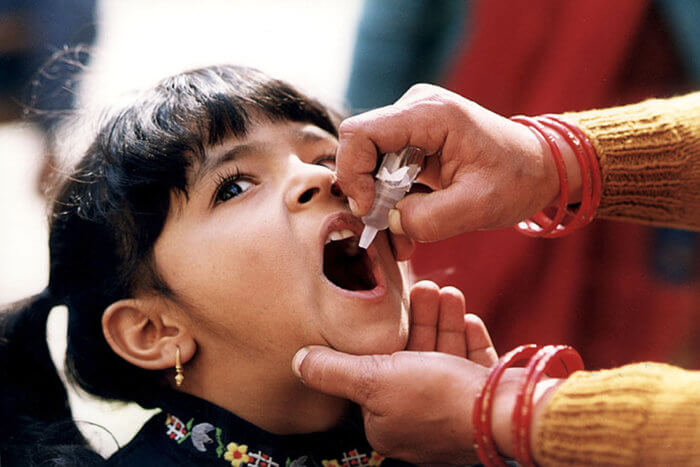
For adults who know they were vaccinated — many, including Chapnick himself, remember getting the oral vaccine on a sugar cube as children — there’s “really nothing to do right now,” in terms of getting a booster or an updated shot, Chapnick said, unless they are traveling to a country where the disease is still common.
According to the city and state health departments, adults who have been fully vaccinated but may be at greater risk of exposure — like if they live or work in an area with low vaccination rates — should consult with their primary care physician to see if they should get a booster.
All pediatricians’ offices should have the polio vaccine readily available, Kojaoghlanian said, and adults may also be able to get the vaccine at their regular family or primary care doctor. The city also offers free or low-cost vaccines at the Fort Greene Health Center, though the polio vaccine is only offered for children ages 4-18 at that clinic.
Unvaccinated adults and navigating medical red tape
After the city announced that polio had been found in New York City’s wastewater last month, dozens of younger adults took to social media to joke about texting their parents to ask if they had received the vaccine as children. New York City public school students are required to have received the vaccine, and it is still given with the regular childhood vaccinations, despite the previous rarity of the disease.
Who else in NYC texted their mom to double check their polio vaccine status? https://t.co/PQA5o5Vkz3
— Brandon Wall (@Walldo) August 12, 2022
But some adults — like Miranda — know they haven’t been vaccinated.
Born in the early 90s, Miranda said she was not vaccinated because her parents, struggling to care for her older sibling, who was diagnosed with autism, falsely assumed the condition had been caused by vaccinations.
“They weren’t getting any good medical advice, so they went to the bad medical advice, and they believed very strongly that vaccines were a risk for autism,” she said. “The reason I was unvaccinated as a child is absolutely misinformation to do with vaccines in autism, which I think became a lot more prevalent after I was a child.”
Many studies have proved that vaccines and vaccine ingredients do not cause autism, and an oft-cited study connecting vaccines and autism has been widely debunked. Still, many parents believe vaccines will cause their children to develop the condition. Miranda pushed back on those beliefs — and said that in addition to spending time trying to get vaccinated, she has also realized that the underlying message there is that it is “better to risk catching a serious disease than to be autistic.”
In her efforts to receive other vaccines, Miranda had been given various tests to see if she had antibodies from vaccines before she could be vaccinated. She spent weeks unsuccessfully trying to get the test from her doctor’s office before she called the city’s Department of Health, she told Brooklyn Paper, and was referred to the Fort Greene vaccine clinic.
She made an appointment at the clinic for Aug. 11, a day before polio was found in the city’s wastewater. At that appointment, she found out the clinic doesn’t administer blood tests, so she decided to try to make another appointment to receive the vaccine.
The person working at the clinic that day asked for her ZIP code, then said she was not eligible for a vaccine as an adult because she did not live in one of the priority neighborhoods.
Flustered, Miranda snapped a photo of a sheet of paper outlining adult polio vaccine eligibility before she left — and later realized that it said any adult who was not vaccinated was eligible for the shot, regardless of other factors.
“He just kept saying, ‘You don’t qualify,’” she said. “It sounds like maybe there hasn’t been a lot of training or messaging around it, which is kind of what’s driving me crazy. There’s all of this messaging aimed at parents, because maybe you have a school-aged child, whose vaccinations are delayed or something like that. But there’s also adults who are trying to get them, and there’s been no messaging aimed at adults.”
Miranda never heard back from her doctor’s office, and, when she called 311 in late August, was advised to try to get a vaccine at an NYC Health + Hospitals location. On Aug. 28, she got through to someone who worked directly for the Fort Greene clinic, who told her a new batch of appointments would be made available the next day.
And so, on Aug. 29, Miranda booked a vaccine appointment for Sept. 7 — though the day before the appointment, she was still worried that it wouldn’t work out.
“The whole thing really just encapsulates the experience that I and others, especially in the disability and chronic illness community, have been having in terms of essentially having to do your own medical research — either due to lack of services in general or due to healthcare providers not having the relevant knowledge — but then you’re also castigated for coming in to the doctor having done that research,” Miranda told Brooklyn Paper on Sept. 6.
The disease, treatment, and encouraging people to get vaccinated
The majority of the time, polio infection causes a “very mild” illness, Kojaoghlanian said, with cold-like symptoms including a fever, sore throat and headache. Because of the mild symptoms, most people don’t know they have polio, and may end up transmitting the disease to the people around them.
About one in 25 people infected with polio will develop viral meningitis and one in 200 will become paralyzed, according to the Centers for Disease Control and prevention. Paralysis, which usually sets in after the initial illness has run its course, is incurable.
When polio paralysis is fatal, it is often because the muscles in the chest, which allow the person to breathe, stop working, Kojaoghlanian said. The only treatment for polio and polio paralysis is “supportive care,” she explained. There is no antiviral that can prevent paralysis and treatments for those struggling to breathe have not advanced much beyond the iron lung of the 1950s.
It is “notoriously difficult” to get people who are already set against taking vaccines to change their minds, Chapnick said.
“In the case of polio, the fact that there has been a case of paralytic polio in an adult in the New York area may incentivize some unvaccinated people to take the vaccine,” he said. “We are not working with the health department to start providing the vaccine. We’re going to start with one of our adult clinics, see what the demand is, and see where we can go from there.”
The city’s health department will also be working with a “broad range” of stakeholders in local communities to promote the vaccine, a spokesperson told Brooklyn Paper, especially in the lead-up to the first day of school on Sept. 8.
“This includes pediatricians, who we’ve asked to immediately identify, contact and schedule appointments for children in their practices who are behind on polio, varicella, and other routine immunizations,” the spox said.
City health officials held a meeting with leaders of the local Hasidic Jewish community to emphasize the importance of the vaccine, the Jewish Telegraphic Agency reported last month.
It will also be important to remind parents who are too young to have seen polio infection firsthand of the severity of the disease and the success of the first vaccination campaigns, Kojaoghlanian said.
“It would be good to remind them how, again, this is irreversible paralysis with both aesthetic and psychological implications for the child who will get these complications,” she said. “Because the virus is shed in the feces of children, if you’re in a congregate setting like school, you could be exposed to each other’s excretions and secretions.”
Because New York City is so diverse and home to many immigrants whose home countries may have had different requirements or regiments for the polio vaccine, it is even more important to get the shot, Kojaoghlanian said. In some cases, the oral polio vaccine, which is still given in some countries because it’s cheaper and faster to distribute, can result in a polio infection — which is likely how the disease was reintroduced in New York, Chapnick said.
He added that because trust in public health authorities has decreased, he wanted to emphasize that people can receive more information and the vaccine from their primary care provider — no specialists are required.
“I remember my grandparents telling me that their biggest heroes were Dr. [Jonas] Salk and Dr. [Albert] Sabin,” Chapnick said, referring to the two doctors who pioneered the polio vaccines. “My grandparents lived through being terrified every summer that their kids — that is, my parents — would get polio. And then they saw their grandchildren had no risk of polio because of the vaccine.”
For more information on polio and vaccination, visit the city’s Department of Health website.


